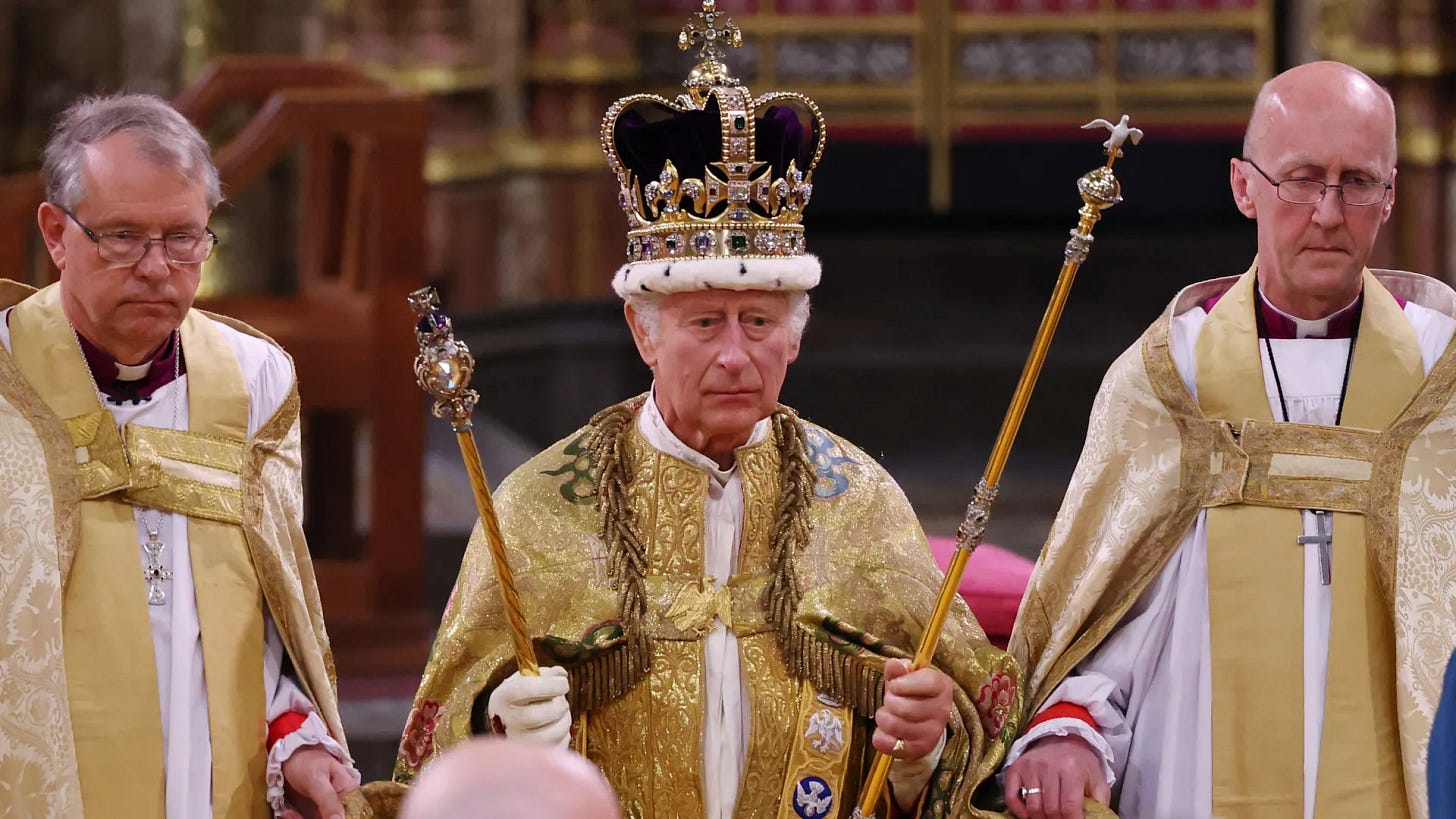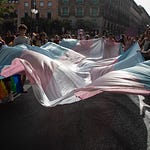[This blog will always be free to read, but it’s also how I pay my bills. So, if you like what you read, please consider a paid subscription. And yes, I do speaking engagements. If you need a Pride Month speaker, hit me up.]
On Saturday, at Westminster Abbey, The Most Reverend and Right Honourable Justin Welby, the 105th Archbishop of Canterbury, placed all 2.23 kilograms of St. Edward’s Crown upon the head of Charles Philip Arthur George.
That’s King Charles III to you plebs.
He’s the oldest person ever to accede to the British throne, and his coronation was a spectacle not witnessed by the world in more than 70 years, which is the same amount of time Charles has been waiting for a promotion. And you thought your professional advancement is underwhelming.
It was an entertaining show. It had to be entertaining. But was it entertaining enough?
Because if it weren’t entertaining enough, what would be the point of the British Monarchy?
It was more difficult to pose that question with Elizabeth II. To most observers, she embodied the dignified — that primary duty of the Crown to serve as something of a spiritual bulwark and compass for her subjects, as a complement to the legal power held by Parliament to actually do something, as envisioned by 19th-century British political philosopher Walter Bagehot.
And where did True North on that compass point for Elizabeth II?
Above all else: preservation of the United Kingdom and allegiance to her constitutional obligations, which is to say: not much.
Elizabeth II was beloved by so many not because of any real power she had to change their lives but because of her unflappable consistency. She held a steady presence in the lives of her subjects and didn’t rock the boat, something which became a great comfort to many over the decades of her reign.
But times change and cracks begin to show. As Elizabeth’s reign endured various cycles of instant mass communications—the introduction of television, the introduction of the internet, the introduction of social media—it became increasingly more difficult to maintain that dignity.
Messy affairs, subsequent divorces, a globally beloved daughter-in-law who had the audacity to recognize her self-worth over the institution (a characteristic practically beaten out of Elizabeth from birth), the occasional racist or sexist remark from husband Phillip (or one of his affairs), the periodic, embarrassing story about son and heir Charles, the allegations of rape against son Andrew, etc.
In hindsight, the poise with which Elizabeth held herself in reaction to the swirling chaos around her is undeniably impressive, and yet, her considered choice to maintain preservation of the Crown over holding it (and the governments formed in her name) accountable will undeniably shape her legacy.
It’s this simple: if we choose to believe that Elizabeth II was intended to be a grand moral beacon, the True North on society’s spiritual compass, we’re bound to be disappointed. But if we choose to acknowledge her intended role as one of the greatest political entertainers of the 20th century, she was certainly successful.
But much like explaining why a joke is amusing, illuminating the actual role of the British Royal Family as the world’s best paid acting ensemble takes the fun out of the experience. We’re not supposed to look behind behind the curtain. We’re supposed to suspend disbelief and skepticism in order to be entertained by all this.
With Elizabeth, it was much easier to suspend that disbelief. Even many anti-royalists held a grudging respect for her consistency and dignified stature. Elizabeth was playing a role that coincidentally wasn’t far off from her private life. Were it not for her, the House of Windsor would have likely imploded decades ago into a shadow of its former self — it existing at all.
The British Royal Family is the most pointless and painful method acting process of all-time. Elizabeth simply lent it undeserved credibility with her extraordinary commitment. She was the Daniel Day-Lewis of royal performance. Beyond reproach.
With Charles III, a man who seems absurdly dedicated to being publicly awkward, almost as though it’s a kink, it is far more difficult to suspend disbelief in order to be entertained. Charles is only convincing as a king in all the least admirable qualities perceived by the public: arrogant, out-of-touch, and self-absorbed.
Is that fair? Well, it doesn’t really matter at this point. Maybe Charles is a wonderful human being behind closed doors. Maybe he’s the victim of some truly atrocious framing by media. Maybe he simply has insurmountable weaknesses in his style of communication.
And maybe… he’s just not really good at this.
Regardless, the public is being asked to suspend disbelief in order to be entertained, and Charles, bless his cotton socks, is simply less-than-convincing in the ways in which it will be necessary to prevent further decline of the Monarchy.
I’ll concede that he doesn’t need to be entertaining if he’s doing something that endears him to the public — like, you know, an actual leader with real authority to shape the lives of his subjects. But that’s very unlikely to happen.
We could be surprised.
Maybe Charles will be a transformational sovereign who finds a way to work around constitutional restrictions on his legal power (which, again, is basically none) or manages to locate something inside himself that exchanges his awkwardness for an image resembling genuine connection with the public.
Maybe Pluto will become a planet again. Maybe the U.S. will win the next Men’s World Cup. Maybe I’ll co-write a song with Brandi Carlile and watch her sing it at the Grammys someday.
Maybe can be an entertaining game.
Unfortunately, maybe just isn’t enough for Charles to keep the public favorably engaged, particularly one that’s ever more cold to him in the wake of Harry & Meghan formally splitting with the House of Windsor.
There are no big British royal weddings on the horizon. No grand royal jubilees. No global spectacles offering entertainment that justifies the citizenry paying a lot of cash to keep the King and his issue comfortable. There are no real opportunities for Charles and the British Royals to globally shine simply for existing.
The only person with the kind of peerless charm and warmth that could have saved the British Monarchy, without need of a global event and embossed invitation, was killed in a Paris tunnel more than 25 years ago.
She was pushed out of the British Royals for the same qualities that made her arguably the most beloved person in the world.
She didn’t need to act. She simply was.
It doesn't matter how many horses and military personnel in silly hats marched in front of them on Saturday. It doesn't matter how many lush robes were draped over their shoulders or the weight of the gold-framed crowns placed on their heads.
Charles and Camilla will never be as loved and respected as Diana, and they know it.
And so, they will attempt to entertain.
Good luck.
Hi, I’m Charlotte Clymer, and this is Charlotte’s Web Thoughts, my Substack. It’s completely free to access and read, but it’s also how my bills! So, please do kindly consider upgrading to a paid subscription: just $7/month or save money with the $70/annual sub. You can also go way above and beyond by becoming a Lifetime Member at $250.














Share this post